Drug trafficking: an overview of Mauritius Customs’ activities
29 October 2024
By Vivekanand Ramburun, Director of the Customs Department and the Capacity Building Team, Mauritius Revenue Authority (MRA)Drug abuse is an escalating concern in Mauritius. According to a survey conducted in 2024 by the non-profit company Afrobarometer, Mauritians consider drug abuse and addiction as the second most pressing issue for government intervention, with only the cost of living surpassing it in importance.
In its 2021 report, the National Drug Observatory, established by the Government of Mauritius in 2015, provided the following snapshot of the situation:
- health: approximately 900 drug-related in-patient treatment cases are recorded each year in public health institutions;
- age group affected: in-patient treatment is prevalent across all age groups, with a notable incidence of drug use among individuals aged 20-34;
- major substances: abuse of new psychoactive substances (NPS) and heroin are the leading causes for in-patient treatment;
- gender distribution: female drug users represent about 10% to 15% of the total drug-using population;
- geographical impact: drug-related in-patient cases are widespread across the country, with significant impacts in both rural and urban areas;
- polydrug use: the use of multiple drugs concurrently is a significant factor contributing to health issues among drug addicts.
The fight against illicit drug trafficking is one of the top priorities of the Mauritius Government. To support these efforts, it engages the Customs Service, alongside the forces of the Police, the National Coast Guard (NCG) and the Anti-Drug Smuggling Unit (ADSU).
The National Drug Observatory has identified cannabis, heroin and NPS as the predominant drugs circulating in the country. This finding is reflected in the seizures made by Mauritius Customs. Heroin and cannabis remain the most common types of drugs seized, while an upsurge in seizures of NPS has been noted in recent years.
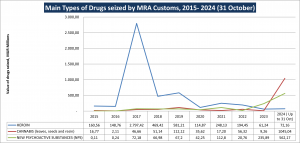
In 2013, Mauritius Customs discovered for the first time synthetic drugs in a parcel transported by the postal operator. It consisted of leafy matter ready for consumption under the brand names Black Mamba and Spice. Subsequently, the Dangerous Drugs Act 2000 (DDA 2000) was amended in 2013 to include synthetic cannabinoids and their derivatives, and later again in September 2015 to include synthetic cathinones, their chemical diversities and derivatives.
From 2015, the number of drug seizures by the MRA Customs Department increased steadily, peaking at 130 cases in 2019 and declining to 46 in 2020 as a result of the slowdown in passenger traffic due to the COVID-19 pandemic. The number of cases of drug seizures then remained stable, averaging at 50 cases for the past 5 years.
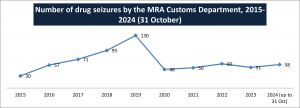
In about 80% of cases, the drugs were detected as a result of risk profiling. In the remaining 20% of cases, the Administration had received a number of tips about the shipment.
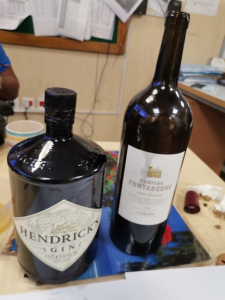
Given that Mauritius is an island, drugs can be brought in by sea or air, concealed in passengers’ luggage, shipped in containerized or loose cargo, or transported in parcels by express couriers or postal operators. The latest trends indicate that large quantities of drugs (especially cannabis) are transported using speed boats – usually coming from Reunion Island and Madagascar, as well as from dhows – various types of traditional sailing vessels used to pick up drug shipments at specific points at high seas.
Cannabis and heroin have historically constituted the primary types of drugs seized at the airport, but, since late 2023, an increase in the number of seizures of cocaine from South American countries has been observed. The trend is also towards NPS and cocaine being in liquid form instead of powdered form. Most drug seizures occurring at courier services involve cannabis and heroin.
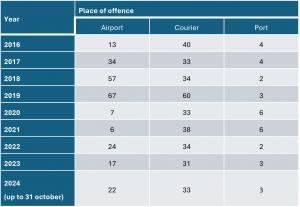
Leadership and commitment
The MRA’s leadership and top management commitment has been instrumental in galvanizing the unflinching support of the Government in terms of providing the necessary manpower, equipping the department with the appropriate tools and equipment, and making crucial structural reforms to boost the fight against the trafficking of illicit drugs and narcotics.
Customs Anti-Narcotics Section
In August 2016, a new leadership at the helm of the Customs Department led to a major reorganization and to the creation of the Customs Anti-Narcotics Section (CANS). This dedicated section comprises the following units:
- Information and Intelligence Unit (IIU) which aims to inform front-line officers about the latest trends and risk profiles as well as advise them how to respond to specific queries;
- Anti-Money-Laundering Unit (AMLU) which seeks to combat offences or malpractices relating to money laundering and terrorist financing in line with the recommendations of the Financial Action Task Force (FATF);
- NarcoPort Unit which operates in the port area, along the island’s coastline and at the Parcel Post Office;
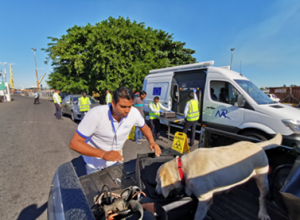
- NarcoAirport Unit which operates at the SSR International Airport, Air Cargo warehouses and courier services based in Plaine Magnien;
- K9 Unit which comprises 16 detector dogs trained to detect narcotics (hard and synthetic), currencies and tobacco, deployed at the port, airport, post and courier services centres and container terminal.
Tools, equipment and technology
Mauritius Customs draws on a panoply of detection and surveillance tools and equipment, systems and state-of-the-art technology in the fight against illicit drug trafficking.
Non-intrusive inspection (NII) tools and “drug loo”
Although no drug shipments have so far been detected in containers by using the equipment, 16 X-ray scanners have been installed at the various points of entry in order to scan containers, palletized cargo (gantry scanner), passenger luggage, cargo boxes and courier items and packages. The MRA Customs Department also deploys a mobile scan van and a mobile container scanner anywhere around the island. Handheld backscatter imaging systems are also used to detect hidden organic materials.
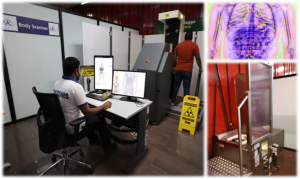
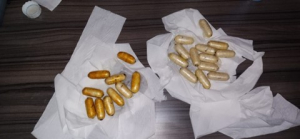
Since January 2022, a whole body scanning facility has been operational at the SSR International Airport, enabling Customs to identify 10 individuals who had ingested illicit substances or concealed them about their person. A “drug loo” has also been installed at the airport to assist in the safe and hygienic recovery of packages containing illicit substances ingested by travellers without contaminating the evidence.
Other technological tools
The following tools are also being used to enhance the MRA’s drug detection capabilities:
- drones for intelligence gathering and aerial surveillance in the port area;
- a portable contraband buster which can indicate the difference in density between the contraband article and the object in which it is hidden;
- a fiberscope used for searching and detecting concealments by viewing in real time images of angles, tubes and difficult access points on vessels and aircraft, in vehicles and to cargo holds;
- trace detectors for drugs/explosives;
- hand-held trace detection devices for narcotics.
Fast interceptor boats
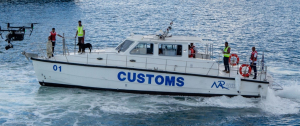 Mauritius Customs runs two fast interceptor boats (FIBs), two rigid hull interceptor boats (RHIBs) and one patrol boat to patrol along the Mauritian coast and outside the harbour where vessels are anchored for bunkering, transhipment or crew change processes.
Mauritius Customs runs two fast interceptor boats (FIBs), two rigid hull interceptor boats (RHIBs) and one patrol boat to patrol along the Mauritian coast and outside the harbour where vessels are anchored for bunkering, transhipment or crew change processes.
Vessel tracking system
The MRA Customs Department uses a vessel tracking system (Big Ocean Data) to gather information regarding vessels’ real-time positioning, target monitoring and enforcement activities more effectively and schedule appropriate actions essential for enforcement purposes. This tool serves to proactively profile and anticipate the arrival of high-risk vessels to plan enforcement actions.
Port Surveillance and Command Centre
The Port Surveillance and Command Centre (PSCC), operational since February 2023, aims to enhance the MRA’s capabilities to protect the country’s borders from the entry of illicit goods. The PSCC consists of three components:
- CCTV Control Room which provides access to 237 cameras belonging to the Mauritius Ports Authority (MPA), Cargo Handling Corporation Ltd (CHCL) and MRA and enables the close surveillance of sensitive locations at the port on a real-time basis. Officers based at the Command Centre interact with Customs’ roving teams as well as officers posted at exit gates by means of walkie-talkies for efficient and effective interventions in the port area.
- Central Scanning Control Room (CSCR) which offers a total solution to centralize and manage the two scanners situated at the Mauritius Container Terminal (MCT). Scanned images are transferred in “almost real time” to the CSCR for image interpretation and final clearance by supervisory officers. The CSCR thus provides for a double layer of control, reduces risks for malpractice and increases supervisory control.
- Body-worn camera (BWC) booths which provide live images of BWCs used by Customs officers while performing physical examinations of goods at the port and freight stations. This solution enhances compliance and supervisory control by assisting officers in their final decision to release consignments.
Data analysis
API and PNR
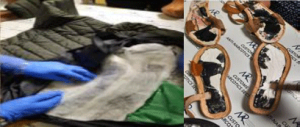 Advance passenger information (API) and passenger name record (PNR) data are analysed in order to profile passengers, leading to many seizures. In 2024, Mauritius Customs officers seized 6.6 kg of cocaine at the SSR International Airport in the luggage of two Bolivian passengers coming from Dubai. The cocaine was presented in many forms: 710 g of a colourless liquid in plastic containers and 640 g of whitish powder and 5,270 g of whitish paste concealed in jackets, sandals, bras and soaps.
Advance passenger information (API) and passenger name record (PNR) data are analysed in order to profile passengers, leading to many seizures. In 2024, Mauritius Customs officers seized 6.6 kg of cocaine at the SSR International Airport in the luggage of two Bolivian passengers coming from Dubai. The cocaine was presented in many forms: 710 g of a colourless liquid in plastic containers and 640 g of whitish powder and 5,270 g of whitish paste concealed in jackets, sandals, bras and soaps.
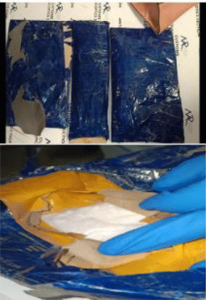 Another notable seizure involving heroin was made at the SSR International Airport in February 2024, with 2.39 kg of the substance found in the luggage of a female Thai passenger who had been profiled and intercepted by CANS officers. The drug was concealed in three parcels wrapped in blue carbon paper and cellophane tape within the false bottom and inner linings of a new lady’s handbag. Further inspection revealed another parcel, wrapped in black carbon paper and cellophane tape, concealed in a new black backpack.
Another notable seizure involving heroin was made at the SSR International Airport in February 2024, with 2.39 kg of the substance found in the luggage of a female Thai passenger who had been profiled and intercepted by CANS officers. The drug was concealed in three parcels wrapped in blue carbon paper and cellophane tape within the false bottom and inner linings of a new lady’s handbag. Further inspection revealed another parcel, wrapped in black carbon paper and cellophane tape, concealed in a new black backpack.
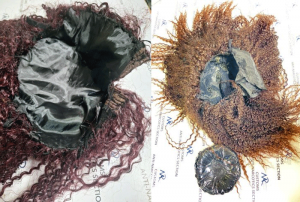
Two other seizures made in December 2023 are worth mentioning. They were made following the inspection of two passengers from Uganda, each arriving on a different flight from Kenya and wearing a wig in which approximately 520 g of heroin was concealed.
Advance electronic information for parcels transported by express couriers
Mauritius Customs receives timely advance electronic information from courier services. This exchange of information enhances the MRA’s risk management capabilities, thus resulting in the effective targeting of suspicious consignments.
Trained officers
Training Customs officers is vital, and the MRA has benefited from the support of specialized agencies and organizations in this area.
Specialized training
Of particular importance were the training courses on “Narcotics Investigations” and on “Combating Illicit Drug Trafficking”, both of which were conducted by the US Drug Enforcement Administration (DEA) in 2018 and 2022, the Regional Training on the Identification of new Psycho-Active Substances and Profiling Techniques held virtually in October 2021 with experts from the Forensic Science Laboratory (FSL) as well as MRA officers, and the Port Security Training held in March 2022 and August 2023 and conducted by UNODC and INTERPOL.
‘Ship in a Box’ training facility
In November 2023, UNODC handed over to the MRA a Visit, Board, Search and Seizure Simulator (VBS3) also known as a ‘Ship in a Box’ that was designed and constructed by the US Department of State’s Bureau of International Narcotics and Law Enforcement Affairs (INL) and funded by UNODC under the Global Maritime Crime Programme. This facility is used as a ship simulator for the practical training of officers of the MRA’s Customs Department and other regional enforcement agencies with a view to enhancing boarding, searching and tactical operations in the fight against the illicit trafficking of drugs and other contraband.
A Port Control Unit under the UNODC-WCO Passenger and Cargo Control Programme
A Port Control Unit (PCU) was established in January 2024 under the Passenger and Cargo Control Programme which is jointly managed by the United Nations Office on Drugs and Crime (UNODC) and the World Customs Organization (WCO). PCUs are “joint units” comprising Customs officers and other national law enforcement personnel. In Mauritius, the PCU consists of 12 Customs officers and three NCG officers. They have all received training in profiling techniques, cargo inspection, information exchange mechanisms, port seizure investigations and trade facilitation. In November 2023 in Vienna, two Customs officers and one NCG officer also participated in further training on the safe handling of synthetic opioids, use of Raman drug detecting devices, and drug and precursor identification kits. To date, examinations conducted by the PCU have resulted in several cases of commercial fraud and IPR infringement, as well as leading to the detection of one case of imported synthetic drugs.
Collecting and sharing data
The MRA makes good use of the various networks available for gathering, sharing and disseminating drug-related data at both local and international level.
Online platform for the control of precursor chemicals and dangerous drugs
Importers, wholesalers, retailers and pharmacists are required to report purchases of legal drugs and substances used in the illicit manufacture of psychotropic substances through an online platform which is managed by Mauritius Customs. Data entries are monitored by the Pharmacy Board which is a governmental agency under the aegis of the Ministry of Health.
The WCO Customs Enforcement Network
Customs officers report seizure data in the WCO Customs Enforcement Network (CEN) and analyse data reported by other countries so as to update risk indicators and improve targeting capacities.
The Pre-Export Notification Online System
Parties to the 1988 Convention against Illicit Traffic in Narcotics Drugs and Psychotropic Substances must notify each other before the export of certain precursor chemicals which can be used for the illicit manufacture or production of drugs. They use the Pre-Export Notification (PEN) Online System to do so. Managed by the International Narcotics Control Board (INCB), it enables the online exchange of information between competent national authorities. In Mauritius, the Pharmacy Board, which is under the aegis of the Ministry of Health, receives and inputs data in the system, and suspicious shipments are communicated to Mauritius Customs.
Mechanisms of international cooperation
The MRA has signed Customs Mutual Administrative Assistance Agreements (CMAAAs) with the Customs Administrations of the Netherlands, Pakistan, the US, France, Belgium and the Republic of Madagascar. Establishing a similar form of cooperation, a Memorandum of Cooperation (MOC) was signed between the MRA and the Seychelles Revenue Commission.
Drugs destined for Mauritius usually transit through or originate from Reunion Island (France) and Madagascar. The CMAAAs with these two countries in particular have been very useful for sharing information that has led to many drug seizures.
A new collaboration mechanism has recently been established with Afghanistan and Pakistan Customs in the wake of the newly identified “southern route” or “smack track”, a network of routes stretching from Afghanistan through Pakistan and Iran, across the Indian Ocean to eastern and southern regions of Africa.
Cooperation and support of key institutions and agencies
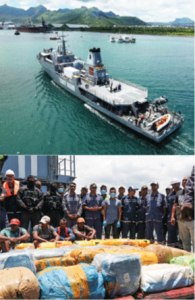
Mauritius Customs collaborates with law enforcement authorities such as the Police/ADSU and the NCG. For instance, recently the MRA Customs Department and the NCG jointly conducted several high-profile and risky missions at sea that have led to the seizure of drugs and equipment, including speed boats, as well as the arrest of several suspects, including one drug lord. Mauritius Customs also conducts controlled delivery operations jointly with the Police/ADSU.
On 8 January 2024, Mauritius Customs and the NCG intercepted a colossal haul of 333.1 kg of cannabis in a speedboat, representing the largest drug seizure in the country’s recent history. The operation was the fruit of several months of intelligence work and planning, requiring the deployment of the NCG’s patrol vessel CGS Barracuda and Dornier aircraft for aerial surveillance, along with other smaller vessels.
Mauritius Customs shares with the Financial Intelligence Unit (FIU) information with regard to currency declaration forms submitted by passengers. It also works with the Financial Crime Commission which detects, investigates and prosecutes financial crimes and the financing of drug dealings. In 2020, a Mauritian passenger travelling to Madagascar with a large amount of cash was intercepted by Customs officers at the airport. He was unable to give credible reasons for travelling, nor could he substantiate the source of the money. Despite the fact that the money was detained by Mauritius Customs and he had missed his flight, the passenger booked another flight via Reunion Island. Payments of air tickets were also effected in cash. All these elements led to the suspicion that the passenger was involved in drug trafficking. The case was referred by Customs to the FCC and, upon further investigation, the passenger was arrested and later extradited to Reunion Island where he was sentenced for a drug dealing offence.
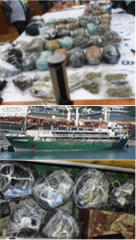 On 13 June 2020, after analysing all available information, officers of the Customs Anti-Narcotics Section decided to search a livestock carrier with the help of NCG officers. The ship was coming from South Africa, and its crew members were of Indian and Tanzanian nationality. Seven packages wrapped in plastic and containing hashish and cannabis were found in the cabin of a supernumerary who was employed as superintendent to supervise operations and ensure the security of the cargo.
On 13 June 2020, after analysing all available information, officers of the Customs Anti-Narcotics Section decided to search a livestock carrier with the help of NCG officers. The ship was coming from South Africa, and its crew members were of Indian and Tanzanian nationality. Seven packages wrapped in plastic and containing hashish and cannabis were found in the cabin of a supernumerary who was employed as superintendent to supervise operations and ensure the security of the cargo.
Awareness-raising and education
Mauritius Customs has developed a mobile application called “DrugFreeMoris” to raise awareness among the general public about the evils of drug trafficking, provide information about treatment, rehabilitation and social reintegration programmes, and share drug victims’ stories.
In 2017, it launched the “STOP DRUGS” initiative to encourage members of the general public to communicate any information they may have on illicit drug trafficking through the use of a dedicated email address (stopdrug@mra.mu) and hotline. Many alerts about drug dealings taking place inland have been triggered through this initiative. All information received was forwarded to the ADSU.
Way forward
The MRA intends to invest further in the acquisition of tools and equipment such as high-performance drones, additional luggage and cargo scanners at the island’s main port and airport and X-ray body scanners for the port’s cruise terminal.
The Administration is currently in the process of negotiating CMAAAs with the Customs Administrations of Turkey, the United Arab Emirates, the People’s Republic of China, Afghanistan and India. MOCs are also in the pipeline with the Afghanistan Revenue Department, the Directorate General of Customs of the Union of Comoros, the Tanzania Revenue Authority, the Mozambique Revenue Authority and the Directorate of National Taxes and Customs of Colombia.
In addition, training will continue to be provided to officers to keep them abreast of changing trends in drug trafficking, new drugs and new detection methods, including new technologies developed to combat drug trafficking more effectively.
More information
Vivekanand.Ramburun@mra.mu
Customs@mra.mu



